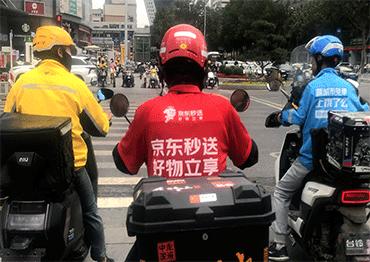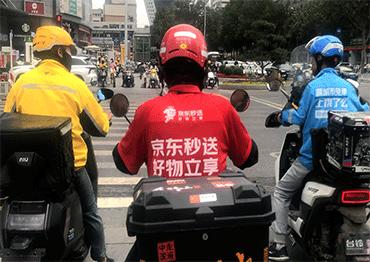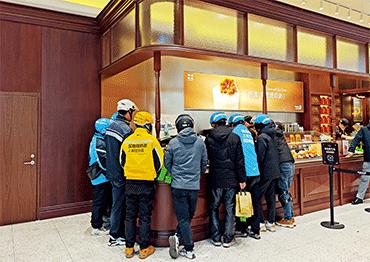While JD Food Delivery may struggle to grab a bigger slice of the market share, it has already made waves.
On March 1, it became the first delivery platform to offer its couriers China’s five types of mandatory social insurance: pension, medical, unemployment, work injury and maternity.
Within 20 days, more than 10,000 couriers signed formal labor contracts. The company aims to employ 100,000 delivery workers in three months.
By contrast, platforms like Meituan and Ele.me have long outsourced their management of delivery riders to smaller, third-party human resource companies in a bid to maintain an “asset-light” model and please investors, according to Overwork: Takeaway Drivers Under the Platform Economy, a book by Sun Ping, associate research fellow at the Chinese Academy of Social Sciences.
Under this model, couriers are under intense pressure to meet quotas. Many race through traffic, and in 2023 alone, 12,000 accidents involved delivery drivers, Guangming Daily reported last July. This has sparked public debate over who should be held liable for compensation.
While the triangular relationship between platform, outsourced management and drivers is not currently covered by China’s labor laws, recent court cases have been setting legal precedent.
In 2021, a Shanghai district court ruled that a third-party human resource firm had to compensate a delivery driver who was injured on the job in 2019. The firm’s appeal was rejected in 2022, the Southern Metropolis Daily reported in July 2024.
“Providing social insurance is essential to regulating platform labor,” said Chen Long, a sociology researcher at China Agricultural University, worked as a courier for six months in 2018 while writing his PhD thesis at Peking University. “The issue has been discussed for years, but JD Food Delivery was the first to act,” he told NewsChina.
Still, JD’s impact remains limited. Compared with Meituan’s 7.45 million and Ele.me’s 4 million couriers, JD’s direct hires are a drop in the ocean. Meanwhile, JD.com still relies on nearly 1.3 million outsourced couriers through retailing and logistics platform Dada Now, none of whom receive social benefits.
Meituan is now piloting pension programs and social insurance for deliverers, beginning in Nantong, Jiangsu Province in May.
But high worker turnover remains the biggest hurdle.
“Only those over 45 care about social security, not me,” said a 34-year-old deliveryman, speaking anonymously. “I don’t expect to do this job for another 30 years.”
To address this, Chen proposes a new model of social governance, one that extends benefits to workers without fixed employment relationships. “This is essential to meet the challenges of our changing labor market,” he said.

 Old Version
Old Version

